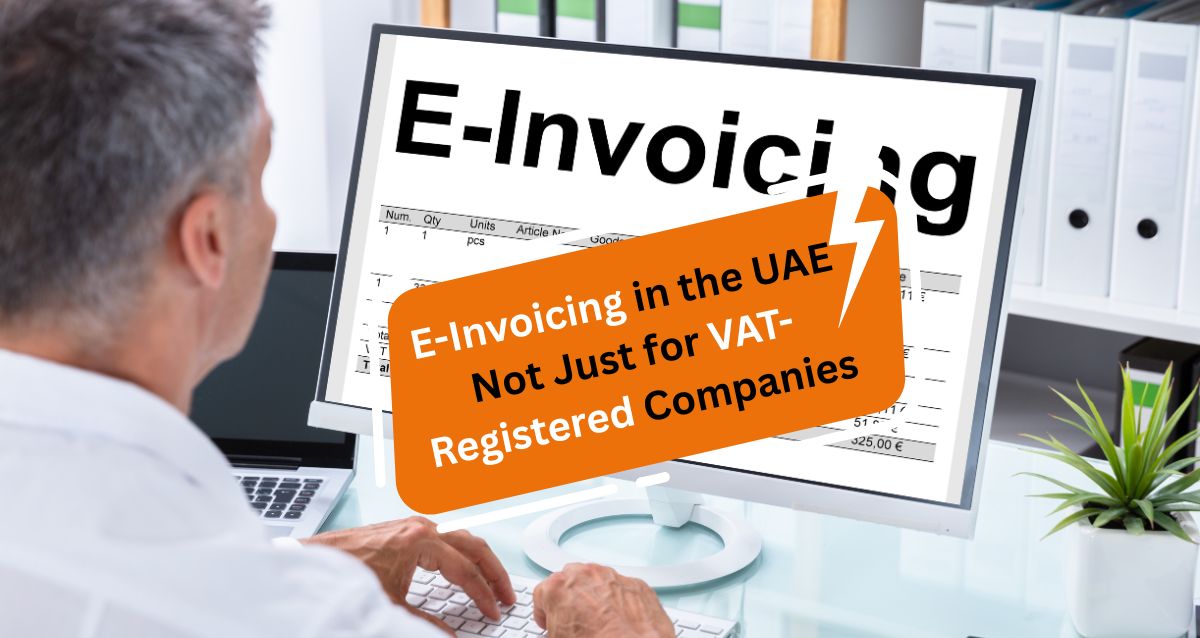E-Invoicing in the UAE: Not Just for VAT-Registered Companies
The Ministry of Finance released Ministerial Decision No.243 of 2025 on the Electronic Invoicing System E-Invoicing System. Since then, many businesses in the UAE have been asking major questions:
Does e-invoicing apply to everyone or only to VAT-registered companies?
My company is not VAT registered because we are doing high-sea sales. Should we still comply with e-invoicing requirements?
The simple and straightforward answer is no. The Electronic Invoicing System is much deeper and broader in scope. The system focuses on any person conducting business in the UAE, not just VAT registrants.
In this article, let us understand the concept of E-Invoicing, clear up the confusion in the market, and give you a clear understanding about who must comply, by when, and why this new shift matters for all businesses in the UAE.
What Ministerial Decision No. 243 of 2025 Says?
Ministerial Decision No.243 of 2025 explains the scope, obligations and exclusions for the new Electronic Invoicing Systems.
Article 3 of the ministerial decision outlined the scope of application as:
This Decision shall apply to any person conducting business in the UAE in respect of every business transaction, except where the person or business transaction is excluded
This clearly states the intention of the authority that the e-invoicing obligation is not only for the VAT-registered companies, it is applicable to everyone who conducts business activities, unless the business activity or business is excluded. The list of excluded activities and excluded persons is also given in the MD 243 of 2025.
What Is the Electronic Invoicing System?
The E-Invoicing System is a structured electronic platform that enables:
- It is a real-time or most possible real-time data sharing with the UAE Federal Tax Authority (FTA).
- A specific electronic format is used to issue the invoices and credit notes and transmit the same to the authority.
- Intending to automate compliance and real-time reporting for greater transparency.
E-Invoice has a specific format of reporting and it requires to be structured, machine-readable and automatically processed by the system. The invoices generated from your current accounting software, in PDF or Image, cannot be considered as e-invoices.
Who Must Comply?
The Electronic Invoicing System applies to:
- All businesses operating in the UAE, regardless of jurisdiction, like the mainland and Free Zones.
- Any person who is conducting business transactions in the UAE, both VAT-registered and non-registered entities, must comply with the e-invoicing system.
- Any person can voluntarily adopt the system.
However, there are exclusions as per Article 4 of MD 243 of 2025, such as:
- Sovereign activities conducted by Government Entities.
- Services related to international air transport.
- Certain financial services are exempt from VAT.
Only a few people or transactions are not covered in the e-invoicing programme. The majority of regular business transactions are covered in the e-invoicing scope, including non-VAT registered businesses if they issue any invoices relating to their business activities.
Implementation Phases
Article 13 of Ministerial Decision No. 243 of 2025, supported by Ministerial Decision No.244 of 2025, and states that UAE’s shift to e-invoicing will happen in phases.
Expected Timelines:
- July 2026: Pilot Programme starts with certain selected businesses.
- January 2027: Mandatory go-live for businesses with annual revenue of more than AED 50 million.
- July 2027: Mandatory go-live for businesses with annual revenue less than AED 50 Million, government entities.
The phased approach can make sure that all businesses have adequate time to prepare, find out and appoint Accredited Service Provider, and comply with FTA’s standard for e-invoicing.
Clearing Up the Confusion

Here are some of the most common misconceptions currently circulating in the UAE market — and the facts according to the law:
|
❌ Misconception |
✅ Clarification |
|
Only VAT registered companies should comply with E-Invoicing |
The Electronic Invoicing System must be adopted by any person conducting business in the UAE, not just VAT registrants. |
|
Applicable for companies that issue tax invoices |
Even non-taxable business transactions may fall under the e-invoicing framework. |
|
Small businesses can ignore the e-invoicing system until they register for VAT |
Once the implementation phases reach to small businesses, they all should comply with e-invoicing standards and framework. |
|
E-Invoicing means sending system-generated invoices to FTA in PDF. |
No. E-Invoicing system works automatic transmission of invoices created from ERP to FTA in a structured electronic format through the Accredited Service Provider. |
|
E-Invoicing is an optional digital upgrade |
As part of the UAE’s digital tax infrastructure, E-invoicing will become mandatory to all in phases. |
Why E-Invoicing Matters for Every Business
1. Compliance and Transparency
The shift to E-Invoices will give a clear view to FTA on all invoices generated by businesses which will reduce the frauds and errors.
2. Automation and Efficiency
While e-invoicing reduces manual data entry, it will help businesses in faster reconciliation and fewer disputes.
3. Simplified Audit Trails
Tax Audits will be easier since the e-invoicing keeps all the records in digital formats.
4. Future Integration with VAT and Corporate Tax Systems
In order to unify the tax compliance ecosystem, the Electronic Invoicing System will like with Corporate Tax reporting as well.
How to Prepare
Businesses should begin preparation early by:
1. Reviewing the current accounting and ERP system to ensure the system is compatible with structured data formats (UBL or XML)
2 . Research and find out feasible Accredited Service Providers listed by the Ministry of Finance and engage them for the system.
3. Proactively train the finance team and invoicing team on the new requirements.
4. All the records (including invoices) must be stored in the UAE for the specific period mentioned in the Tax Procedure Law.
In short:
E-invoicing is not just for VAT payers — it’s for everyone conducting business in the UAE.
How Flyingcolour Tax and Consultant Can Help?
At Flying Colour Tax Consultant LLC, we help UAE businesses:
- Understand the E-invoicing requirements and scope
- Evaluate system readiness and compliance gaps
- On-board with Accredited Service Providers
- Integrate VAT, Corporate Tax, and EIS processes
To learn more about E-Invoicing in the UAE: Not Just for VAT-Registered Companies, book a free consultation with one of the Flyingcolour team advisors.
Disclaimer: The information provided in this blog is based on our understanding of current tax laws and regulations. It is intended for general informational purposes only and does not constitute professional tax advice, consultation, or representation. The author and publisher are not responsible for any errors or omissions, or for any actions taken based on the information contained in this blog.



